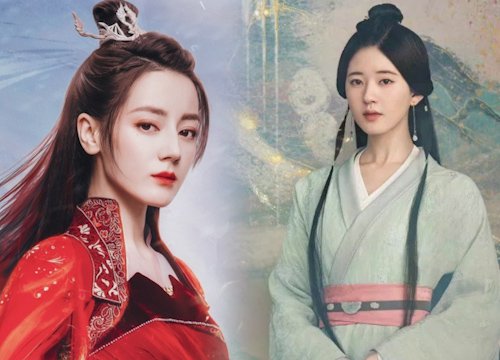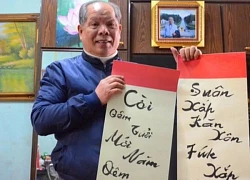Phuong Oanh is suddenly likened to the Vietnamese version of Co Luc Na Trat, which has many difficult points in common

3 | 0 Discuss | Share
Dubbed the "Marie Curie of China", Vuong Trinh Nghi has become a bright star in the field of science. She was an almighty woman, adept in astronomy, mathematics, geography, medicine, and poetry.
In the 33rd year of the Qianlong Emperor's reign (1768), Wang Zhengyi was born into a well-educated family in Jiangsu.
Her grandfather, Wang Jia Fu, used to work as a tri government with the golden rule: "The officials are honest, love the people like their children, treat the government like home".
Her father, Vuong Tichsen, used to be an official of the county, because he failed many times in the imperial exams, he turned to medical research and became a famous doctor in one area.
Growing up in a religious family, Vuong Trinh Nghi from a young age was fortunate to receive a very good education. However, in the period of ancient Chinese feudal society, such a home study environment was not enough to produce female scientists with extraordinary knowledge. Without these later experiences, Vuong Trinh Nghi would probably have become a character like Lam Dai Ngoc in "Hong Lau Mong".
In 1779, Wang Jiafu died in the Northeast while being exiled to Jilin for blasphemy, leaving an intellectual treasure of 75 huge bookcases to Vuong Trinh Nghi, when she was only 11 years old. year old.
There are not only rich literary works, but also books by ancient masters of science such as To Chong Chi, Tang Nhat Hanh, Quach Thu Kinh (an astronomer, irrigation engineer, mathematician, etc.). and Chinese politicians, living in the Yuan Dynasty)... In which, To Chongzhi's books are of great value because he is a famous scientist of the Southern and Northern Dynasties in Chinese history, also a man The first in the world to calculate pi to 7 decimal places and many other outstanding scientific inventions.
Under the tutelage of his grandfather and father, Vuong Trinh Nghi did not let them down. With a huge collection of books left by her grandfather, she was immersed in the knowledge pool day and night. She even wrote the sentence "There is no poverty in studying life, while holding knowledge is a precious treasure" to encourage herself.
Five years after his grandfather's death, Vuong Trinh Nghi almost read all the book treasure he left behind. At the age of 16, she returned from the Northeast to her hometown in Jiangsu with her parents, then followed her father and grandmother to practice medicine everywhere.
From the Northeast to Jiangsu, again from Nanjing to Beijing, then to Shaanxi, Hunan, and even to the East of Guangdong. For more than 2 years, she has traveled in all directions, the journey is so long that it is impossible to count.
Experiencing the human condition, customs and culture in many localities has helped Vuong Trinh Nghi completely break the limitations in the way of thinking of ordinary women.
It can be said that Vuong Trinh Nghi is the earliest representative character fighting for equality of women in the Qing Dynasty.
After "reading 100,000 books and walking ten thousand miles", Wang Trinh Nghi, now 18 years old, returned to Nanjing to set up a business.
Five years in Jilin, studying the books left by her grandfather, while learning horseback riding and martial arts from a woman in the local Mongolian army. She even reached the level of "riding a horse, throwing a rope, galloping like flying".
So, back in Nanjing, she began to freely research and explore her own science.
Starting with the math that my grandfather taught me from a young age. From the 13 volumes of Vuong Trinh Nghi's "Duc Phong Dinh Tuoi Tre" left by Vuong Trinh Nghi, we can discover her research related to trigonometric functions and the Pythagorean theorem.
"The solution of the Pythagorean Triangle" made up a significant part of her research, analyzing in detail the formulas of trigonometric functions from the West that no one else understood at the time. These studies were of great significance to the development of Chinese numerology.
Vuong Trinh Nghi is deeply aware of this point, so she not only tried to explain "Western studies", but also simplified and edited Mai Van Dinh's "Mathematics Mai Thi", a set of research works that were originally published in the journal Science. respected by her grandparents.
She synthesized "Calculation" into "Simplified Calculus" and adjusted Mai Van Dinh's "Original Calculation" (Arithmetic in sticks) to "Explaining Calculus". Unfortunately, these two works, a total of 7 books, were lost.
In the field of astronomy, Vuong Trinh Nghi left works such as "Axiom of Precession" (or Precession of the Axis, the very slow and continuous variation of the orientation of the axis of rotation of a celestial body). , "Differentiation of the Zodiac and the Equator" and "Treatise on the round earth".
What Vuong Trinh Nghi did was synthesize the theories of Yu Hy, Cho Chong Chi, Zeng Nhat Hanh, Guo Shujing and other predecessors, and combine the Chinese and Western calendars, finally bringing the a more accurate conclusion that "every 70 years, the winter solstice moves back by 1 degree".
More importantly, Vuong Trinh Nghi confirmed the correctness of the "spherical earth" theory through various "earth experiments" while the "round sky and square earth" theory was still popular at that time. . This was a very advanced scientific understanding in the middle of the Qing Dynasty.
It is for this reason that in the next work, Vuong Trinh Nghi has correctly explained the relationship between the positions of the sun, the earth and the moon when the solar and lunar eclipses occur along with the causes. of these astronomical phenomena. She then wrote the book "Explaining the Lunar Eclipse" for posterity to learn.
Remember, Chinese folk at that time always believed: "The tengu eating the moon is a bad omen". From there, it can be seen that Vuong Trinh Nghi's thoughts and research results are beyond the limits of time and space.
In that context, Vuong Trinh Nghi's research achievements were spread to distant Western lands through missionaries. Thanks to that, she became a bright star in the field of science, dubbed the "Marie Curie of China".
However, unfortunately, Vuong Trinh Nghi died of illness at the age of 29. A large number of manuscripts of scientific research results were also lost afterwards, only a very small part remained, but it was enough for them. We see her greatness.
Looking back at Vuong Trinh Nghi's life, many people may think that she has not had any breakthrough scientific research results. However, we also need to consider that due to the limited circumstances of the times, Vuong Trinh Nghi, a woman in the feudal period, produced many research results at the age of 29, which was enough to prove her ability. her extraordinary.
In 1994, the Working Group on the Catalog of Planetary Systems of the International Astronomical Union (IAU) named the newly discovered dome on Venus after "Vuong Trinh Nghi". Thereby, it can be seen that her influence in the international scientific community is far beyond the imagination of ordinary people.
Sun Di revealed a post-divorce appearance, the star's color defied orange  Hoàng Anh15:09:47 31/08/2022The divorce event of Sun Di and Dong Tu Kien made many fans of the couple worried that their idol would find it difficult to regain balance in life. However, recently, many fans caught Ton Di traveling with friends. When asked to take a photo with, the 9X star happily posed and...
Hoàng Anh15:09:47 31/08/2022The divorce event of Sun Di and Dong Tu Kien made many fans of the couple worried that their idol would find it difficult to regain balance in life. However, recently, many fans caught Ton Di traveling with friends. When asked to take a photo with, the 9X star happily posed and...

3 | 0 Discuss | Share

2 | 0 Discuss | Share

3 | 0 Discuss | Share

4 | 0 Discuss | Share

5 | 0 Discuss | Share

5 | 0 Discuss | Share

2 | 0 Discuss | Share

1 | 0 Discuss | Share

3 | 0 Discuss | Share

5 | 0 Discuss | Share

2 | 0 Discuss | Share

3 | 0 Discuss | Share








3 | 0 Discuss | Report